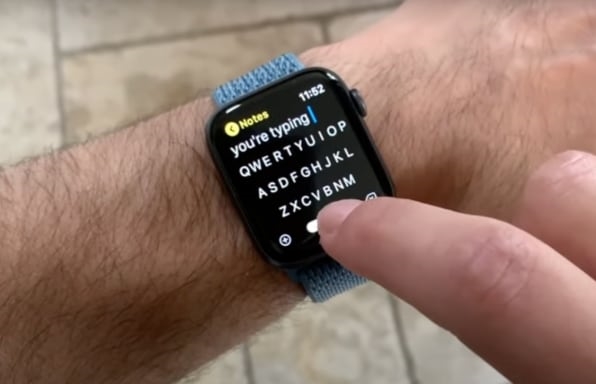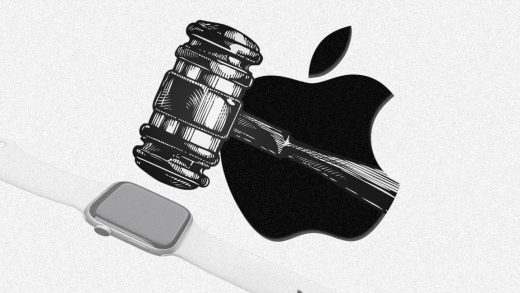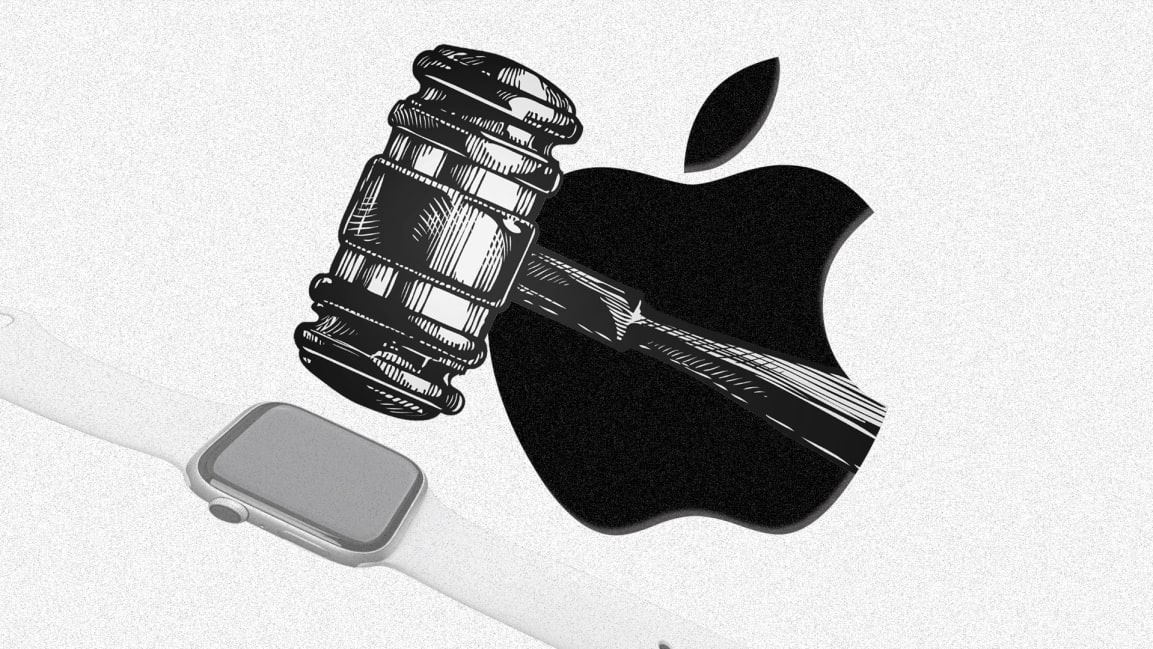App Store scams are rampant. Now a fed-up developer is suing Apple over them
Kosta Eleftheriou, an iOS app developer, says there’s a simple way to investigate whether an iPhone app might be a scam.
The first step is to ignore the app’s average star rating and featured reviews, which he says are too easy for developers to artificially inflate. Instead, you should look at the full list of written reviews, sort them by “Most Recent,” and start searching for patterns. Glowing reviews filled with bad grammar and nonsensical sentences are a bad sign, but the real tells are the one-star reviews. If you spot users complaining about astronomical in-app purchase prices or features that don’t work as advertised, the app is probably much worse than its stellar score lets on.
“You’ve got to make sure that you do a little bit of work,” Eleftheriou says. “You want to investigate.”
Eleftheriou has done plenty of his own App Store sleuthing in recent months. After discovering that a shoddy imitation of his popular FlickType keyboard app was charging customers hundreds of dollars per year in subscription fees, he launched his own crusade against App Store scams in general. On Twitter, he regularly flags apps that appear to be purchasing fake reviews and tricking users into making expensive in-app purchases, and he’s called out Apple for not doing enough to stop them.
Up to now, I’ve been in the “Apple *wants* to do the right thing” camp. My viewpoint is starting to change.
How to spot a $5M/year scam on the @AppStore, in 5 minutes flat:????
— Kosta Eleftheriou (@keleftheriou) February 6, 2021
Now, Eleftheriou is raising the stakes by suing Apple itself. In a lawsuit, Eleftheriou accuses Apple of fraud, false advertising, unfair competition, negligence, and failure to operate in good faith. The complaint cites Eleftheriou’s own experiences with Apple—he claims the company discussed acquiring his FlickType app, only to later throw up roadblocks to him releasing it in the App Store—and with the company’s failure to keep out “barely usable” copycats. (Apple has not responded to a request for comment.)
The lawsuit says Eleftheriou is seeking compensation for lost revenue as a result of Apple’s actions. But in an interview, he says he’s also hoping for broader changes, if not from Apple then from regulation.
“We should not for a moment accept that this is just a way of life, that the App Store will just have fake ratings and fake reviews that we cannot trust,” Eleftheriou says. “It just doesn’t have to be this way.”
American dream
Eleftheriou’s story is one of a developer who once saw the App Store as a place where any honest developer could succeed, only to become disenchanted as unscrupulous developers have prospered.

[Photo: courtesy of Kosta Eleftheriou]
Originally from Greece, Eleftheriou was living in London when the iPhone’s App Store launched in 2008. After experimenting with a couple of games, he struck gold with an app called iSteam, which filled the iPhone’s screen with fake steam that users could wipe away. The $0.99 app earned Eleftheriou and his codevelopers over $100,000, convincing him to book a one-way ticket to San Francisco and become a full-time app developer.
“I immediately got hooked on the whole platform,” he says.
His obsession with building better touchscreen keyboards soon followed—as did an early predilection for pushing Apple’s buttons. In 2010, he developed a prototype app called BlindType that seemed to auto-correct even the worst typos. And while Apple didn’t support third-party keyboards at the time, he told Engadget that BlindType planned to release an iOS version “to put pressure on Apple to finally allow this kind of thing.” BlindType never made good on that plan, as Google acquired the app later that year.
After spending a year at Google, Eleftheriou still had keyboards on the brain, and so he cocreated a new app called Fleksy with a focus on gesture typing for visually-impaired users. The app was so successful the developers turned it into a mainstream product, raising $3 million in venture funding to fuel its growth.
Once again Eleftheriou couldn’t resist putting a little pressure on Apple. He allowed individual apps to use Fleksy instead of the default iPhone keyboard long before iOS added official third-party keyboard support. But while Fleksy was initially successful, Eleftheriou says it ultimately couldn’t keep up with investors’ expectations for growth. Pinterest acquired the Fleksy team in 2016.
Still, he only lasted at Pinterest for about a year before the entrepreneurial itch took hold once more. He had the idea to create yet another keyboard app, but this time for the Apple Watch. He was unsatisfied with Apple’s text entry options—which included voice dictation, canned answers, and a “Scribble” feature for handwriting letter by letter—and thought he could do better.
“I always felt there was a better way, and so with my experience I decided I was going to leave Pinterest—and leaving a lot of compensation behind—to start building this technology,” Eleftheriou says.
That’s when his real problems with Apple began.
App Store roadblocks
Eleftheriou’s lawsuit against Apple describes a series of struggles to get FlickType onto the Apple Watch. Apple allegedly rejected the app at first because of its subscription model, which Eleftheriou dropped in response. The company then accepted the app into its store, but later changed its mind and removed it, claiming that standalone keyboard apps were in fact not allowed.

[Photo: courtesy of Kosta Eleftheriou]
Although Eleftheriou successfully appealed that decision, pointing out that a competing Apple Watch keyboard app was already available, he spent roughly a year trying to get a separate note-taking version of FlickType into the store. Again, Apple’s rationale was that “full keyboard apps are not appropriate” for the Apple Watch, even though FlickType’s standalone keyboard had already launched, both on its own and through integrations with other apps.
Though the lawsuit stops short of saying the company made an acquisition offer, it claims that at one point, Apple wanted Eleftheriou to “simply give up” on getting FlickType approved and sell the technology at a low price.
Eleftheriou says he felt powerless in these kinds of situations. He notes that when Apple rejects an app, its decision appears in a “Resolution Center” on Apple’s developer portal instead of over email. And if the developer files a new version of their app, it erases all messages from the previous rejection. That system, combined with the way Apple sometimes tries to resolve issues by phone, means developers often don’t have a written record that they can use to back up their claims, Eleftheriou says.
“There are all these behaviors where they are systematically placing themselves in a position where they can totally abuse that position, and have so much power over you, that essentially you’d be afraid to speak up,” he says.
Digging up App Store scams
All of this helps explain why Eleftheriou has become a unique public face in the fight between app developers and Apple. Unlike kerfuffles involving Epic Games, Spotify, Match Group, and Basecamp, his complaints have nothing to do with App Store revenue splits. Instead, his case aligns more directly with users’ interests by targeting dishonest apps.
Even as Apple was slowing down FlickType, Eleftheriou figured that his experience in making keyboard apps would give him a long head start over imitators. What he didn’t count on was that those competitors would simply create barely-functional imitations and use bogus reviews to get rich.
In a Twitter thread from late January, he documented how a keyboard app called KeyWatch promised an Apple Watch typing experience similar to FlickType, even stealing footage from his own promo video in ads on Facebook and Instagram. In fact, the app was “practically unusable,” Eleftheriou tweeted, and demanded an $8-per-week in-app purchase immediately after installing it. (FlickType is free to use and is a $10 one-time purchase for premium features like gesture typing and emoji.)
First, they made an app that appeared to fulfill the promise of a watch keyboard – but was practically unusable. Then, they started heavily advertising on FB & Instagram, using my own promo video, of my own app, with my actual name on it: https://t.co/knnO6Mbiyb
— Kosta Eleftheriou (@keleftheriou) January 31, 2021
Despite the exorbitant cost, KeyWatch’s App Store listing seemed to have excellent reviews. The complaints only surfaced when he dug deeper and found several one-star reviews calling the app a scam. Eleftheriou also found several five-star reviews using duplicate text or describing non-existent and even nonsensical features (such as a built-in calculator and Ctrl-Alt-Delete keys).
Meanwhile, FlickType’s App Store rating sits at 3.4. Eleftheriou says that’s in large part because its the Apple Watch’s limitations. Because the keyboard doesn’t work system wide, he gets a lot of complaints from actual users who want it to work in any app that accepts text input.

[Screenshot: Kosta Eleftheriou]
“My business is suffering from scammers that I can’t compete with,” he says. “Only if I were to sink to the levels that they did and buy reviews and ratings, would I be able to compete, but I’m just not willing to sink to that level.”
Eleftheriou says app makers have little recourse when they feel they’re being ripped off. Apple’s solution, he says, is to set up a mediation process, in which each developer makes their case and Apple orders that any infringing content be removed.
Still, he says that he was stunned to find that the developers of KeyWatch didn’t actually face any punishment for being a blatant scam. Only taking his case public and getting attention from the tech press seemed to change things, as Apple removed the KeyWatch app shortly after. Even then, he had to raise even more complaints to get the developers banished for good.
“Suddenly, I’m calling these people out, and that’s not really what I want to be doing, but I just felt like I had no other choice,” he says.
Since that incident, Eleftheriou has become a de facto point person for digging up ugly examples of App Store abuse. He’s received “dozens” of complaints from other app developers and “hundreds” of complaints from users, and continues call them out on Twitter. There’s the Roku remote control app with a 4.5-star rating that charges $5 per week, the constellation app with a 4.6-star rating that charges $10 per week, the dog whistle app with a 4.5-star rating that charges $10 per week, and the open Quora discussion on how to buy reviews.
To Eleftheriou, all these issues are just a sign of Apple’s indifference to the problem. Setting aside the actual legal merits, the most compelling part of his lawsuit is the argument that Apple is failing hold up its promise of providing a “safe and trusted place” to download apps. There’s no mechanism in the App Store for users to request refunds, nor is there even a way for users to report suspicious apps. And as he’s seen firsthand, some scams go on for years until someone publicly calls them out.
“If I can find these apps so easily, as a developer who has no access to the internal data that Apple does . . . that just shows how much they’ve dropped the ball,” he says.
Fast Company , Read Full Story
(85)



